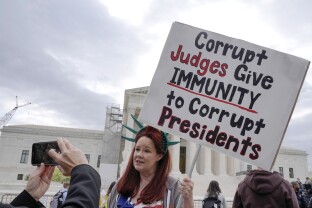The Supreme Court sounded reluctant to embrace some of Donald Trump’s most extreme theories of the powers and immunities of the presidency.
But the former president might have just won the day nevertheless.
Trump’s primary strategy in the swirl of legal controversy around him after leaving office has been to delay in the hopes of winning the 2024 election and further plunging the country into uncharted legal territory.
A majority of justices signaled Thursday that they are considering crafting a landmark opinion recognizing a president’s criminal immunity for some official actions.
“We’re writing a rule for the ages,” Justice Neil Gorsuch said at one point during oral arguments.
Other justices, including Chief Justice John Roberts and Gorsuch, floated the idea of sending the case down to a lower court for further review or fact-finding.
Either of these paths should give Trump a ray of hope.
“The bottom line is that we’re going to get multiple opinions that are going to take a somewhat middle position,” said Rick Hasen, a law professor at UCLA. “That’s probably going to delay things, probably making it very difficult to have a trial in this case before the election.”
At issue is the Department of Justice’s criminal obstruction and conspiracy charges against Trump, related to his attempts to stay in power on Jan. 6 by allegedly attempting to disrupt the ceremonial counting of electoral votes.
Trump challenged the basis for the prosecution, claiming that he had immunity for acts taken as part of his official duties. The case has been on pause since December, with the Supreme Court now considering Trump’s argument for the first time in U.S. history. A trial court judge and the D.C. appeals court rejected Trump’s immunity argument.
Justices forced Trump’s lawyer John Sauer into a series of uncomfortable hypotheticals that illustrated how unchecked the presidency could become if the court wholeheartedly embraced the former president’s theories on presidential immunity.
Justice Sonia Sotomayor asked if a president ordering the military to assassinate his political rival would be an official act exempt from prosecution — something that Sauer acknowledged “could well be an official act.” Justice Elena Kagan asked if using the military to stage a coup would be an official act, which again, Sauer acknowledged “could well be.”
The specter of the court granting immunity for those actions seemed a bridge too far for the court, but several of the conservative justices expressed concern about prosecutorial overreach or subjecting former presidents to endless rounds of criminal liability for actions they took as president.
“That may involve great expense, and it may take up a lot of time. And during the trial, the former president may be unable to engage in other activities that the former president would want to engage in, and then the outcome is dependent on the jury, the instructions to the jury, and how the jury returns a verdict and then it has to be taken up on appeal,” Justice Samuel Alito said about the possibility of charging presidents after they leave office.
The conservative justices also sought to press the government on where to draw the line between conduct that can be criminalized and conduct that is abhorrent or controversial but lawful.
Could Franklin D. Roosevelt have been prosecuted for the internment of Japanese Americans, asked Alito. “Today, yes,” answered Michael Dreeben, the government attorney arguing on behalf of special counsel Jack Smith.
What about John F. Kennedy for the invasion of Cuba, Justice Clarence Thomas asked. Dreeben didn’t directly answer but seemed to indicate that trying to depose Fidel Castro didn’t rise to the level of a crime. Could Barack Obama have been for the drone war? “No risk of prosecution for that course of activity,” Dreeben said.
The result of trying to come to a consensus on the case is likely to result in a complicated decision with numerous dissents and concurrences — and one that may come very late in the Supreme Court’s term. And that’s if they don’t send the case back down to the trial court for more fact-finding, which could give Trump a chance to appeal yet again.
And ultimately, that’s what Trump has been seeking all along.
“I think the people of America are entitled to know whether or not Trump is a felon before they have to cast their ballots,” said Carl Tobias, a law school professor at the University of Richmond. “I don’t know that that’s going to happen.”
—
Byron Tau is a reporter at NOTUS.
Sign in
Log into your free account with your email. Don’t have one?
Check your email for a one-time code.
We sent a 4-digit code to . Enter the pin to confirm your account.
New code will be available in 1:00
Let’s try this again.
We encountered an error with the passcode sent to . Please reenter your email.


